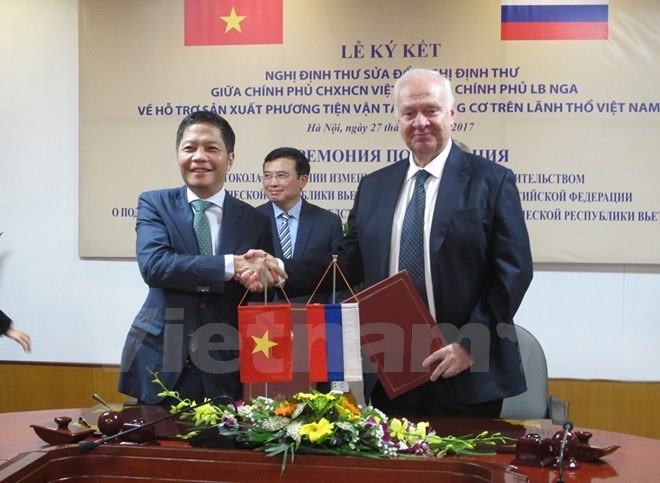 Economy
Economy

Russian vehicle makers will set up joint ventures in Việt Nam to manufacture and assemble trucks and cars with 10 seats and above, crossover utility vehicles and several kinds of special-purpose vehicles.
 |
| Minister of Industry and Trade, Trần Tuấn Anh, and the Russian Ambassador to Việt Nam, Konstantin V.Vnukov, at the signing ceremony in Hà Nội on Wednesday. |
HÀ NỘI — Russian vehicle makers will set up joint ventures in Việt Nam to manufacture and assemble trucks and cars with 10 seats and above, crossover utility vehicles and several kinds of special-purpose vehicles.
This is part of a deal signed between Minister of Industry and Trade Trần Tuấn Anh and the Russian Ambassador to Việt Nam Konstantin V.Vnukov in Hà Nội on Wednesday.
Under the revised protocol, automobiles manufactured by joint ventures must comply with Prime Ministerial Decision No. 08/2017/QĐ-TTgCP and Government Decree No. 116/2017/NĐ-CP. These stipulate the conditions on manufacturing, assembling, importing and trading in warranty services, automobile maintenance and other related documents.
Việt Nam will allow the venture to import duty-free 2,550 complete built-up units and 13,500 sets of automobile parts from 2018 to 2022 as a way of exploring the capacity and tastes of the market.
The revised protocol will provide more favorable conditions for Russian automakers, including KAMAZ, GAZ and UAZ, to explore and penetrate the Vietnamese market as well as creating diverse options for Vietnamese consumers.
Speaking at the signing ceremony, Minister Tuấn Anh said that although the protocol was effective from October 5 last year, it was a new field of co-operation. Management mechanisms and policies for the vehicle industry in Việt Nam were in the process of completion, so enterprises had yet to benefit from the protocol’s preferential treatment.
"The signing of the protocol is of great significance, demonstrating the spirit of friendly co-operation and mutual understanding between the two sides," said Anh.
Ambassador Vnukov said that economic and trade dialogues between the two countries had made progress this year.
Import and export turnover in the first 11 months of 2017 reached more than US$3.2 billion, up 27 per cent over the same period last year. Apart from the traditional fields of co-operation such as oil and gas and tourism, many opportunities are also open for businesses in other fields. — VNS




